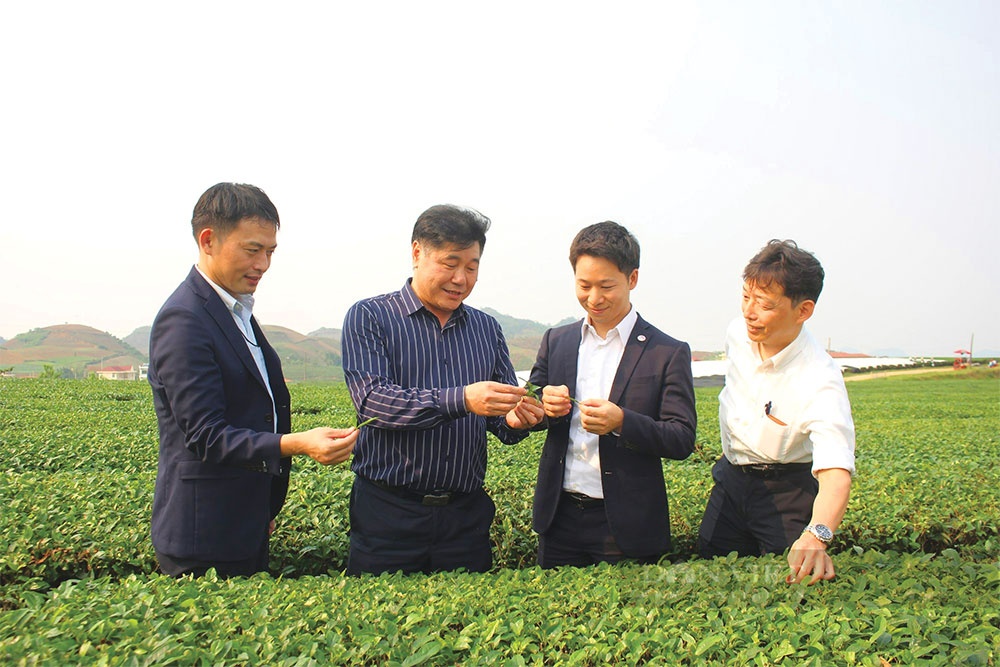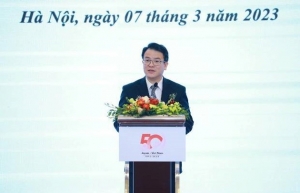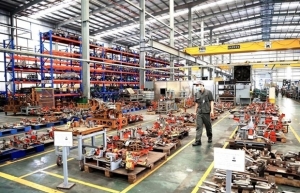Japan at fore of experience in agriculture
 |
| Farmers are having to adapt to new methods, and experts are here to assist, photo Le Toan |
At last week’s seminar on Vietnam-Japan cooperation on green growth in Hanoi, a representative of the Ministry of Agriculture and Rural Development (MARD), said that Vietnam-Japan cooperation in agriculture could double or even triple in the coming decades.
Nguyen Do Anh Tuan, general director of the MARD’s International Cooperation Department, highlighted some key areas for Vietnam, including improving plant varieties, high-tech production and processing, forest protection, capital investment and mitigating the effects of natural disasters.
Some localities in the country have shown great interest in adopting Japan’s high school agriculture education model, which aims to provide agriculture knowledge to students along with high school-level general education. The model, which has been piloted in the northern province of Nam Dinh, has proven popular with students from across the country.
Vuong Thi Minh Hieu, deputy head of the Department of Economic Zones Management under the Ministry of Planning and Investment, said, “The model is in line with Vietnam’s focus on developing and improving the quality of human resources in rural areas, and on attracting foreign investment in agriculture.”
According to Deputy Minister of Agriculture and Rural Development Nguyen Quoc Tri, over the last few years, Japan has been paying more attention to Vietnam’s agriculture sector with $240 million covering 42 projects, ranking sixth among investors pouring into agriculture in Vietnam.
Some of their projects cost almost $80 million. Bilateral cooperation between Vietnam and Japan will create many promising lands for cooperation in areas that both sides need and being strengths of Japan, like green agriculture, digital transformation, and green growth.
“Japan has a lot of experience in developing safe, sustainable, and natural agricultural ecosystem, so Japan’s cooperation and support is significant in implementing Vietnam’s agricultural and rural development strategy,” Tri emphasised.
In 2021, the prime minister approved the National Strategy for Green Growth for this decade and beyond, setting a framework for sustainable development on a nationwide scale with clear objectives, including a harmonious relationship between economic activities and preserving the environment, and leveraging advanced technologies and human resources towards a green economy.
To realise these objectives, Vietnam has recognised Japan as a key partner, as the advanced East-Asian economy possesses the technologies, experience and capital investment required.
Meanwhile, Nguyen Van De, Deputy Chairman of Nghe An People’s Committee, pointed out some difficulties in securing investment capital, advanced technologies and inadequate skilled labour resources for Vietnam to implement its national strategy.
He said Vietnamese farmers had to adapt to new requirements set by international markets with fierce competition, while dealing with the adverse effects of increasingly frequent natural disasters.
“Foreign investors, especially Japanese investors and businesses, can play an important role in addressing these issues,” De said.
Pham Quang Hieu, Ambassador of Vietnam to Japan, said in the medium- and long-term, both countries have significant potential for more cooperation in green technology, energy transition and bilateral research collaboration in applying Japanese technology that aligns with Vietnam’s needs and transition roadmap.
“There is still a lot of potential for future cooperation between Vietnam and Japan, especially in green economy and energy transition,” Hieu said.
According to the Japan External Trade Organization (JETRO) in Vietnam, focusing on green growth will help tackle some of the most pressing issues faced by the country in the coming decades, such as water quality, air pollution, waste treatment, recycling, energy saving and carbon emissions.
“Japanese businesses are setting eyes and looking for some opportunities in Vietnam’s policies on green growth to pour money in confidently,” said Takeo Nakajima, JETRO chief representative.
A JETRO survey showed that 60 per cent of Japanese companies planned to expand in Vietnam, higher than the average in ASEAN. However, greenhouse effects in Vietnam are greater than in other countries, and its environmental performance index is worse than Singapore, China, and Bangladesh.
“These are certain challenges in economic growth, and we are asking Vietnam to soon have solutions and take drastic actions,” Nakajima said.
He also advised the Vietnamese government to implement stricter environmental protection regulations, extend manufacturers’ environmental responsibilities, especially in waste treatment and recycling, and speed up the country’s transition to renewable energies including solar, wind, biomass and hydro, as well as upgrade the national power grid to reduce power loss.
As of August 20, Japan had over 5,160 active projects in Vietnam, with the total registered investment capital of more than $71 billion. Japan currently ranks third among 143 countries and territories investing in Vietnam.
 | MPI to strengthen ODA cooperation between Vietnam and Japan The Vietnam-Japan relationship was one of the most successful bilateral development cooperation relationships in recent years. |
 | Ample room remains for Vietnam-Japan cooperation in supporting industries There remains ample room for Vietnamese and Japanese enterprises to foster cooperation in supporting industries that are increasingly developing and playing an important role in Vietnam's participation in the global supply chain as well as the global value chain, insiders have said. |
What the stars mean:
★ Poor ★ ★ Promising ★★★ Good ★★★★ Very good ★★★★★ Exceptional
Related Contents
Latest News
More News
- Hermes joins Long Thanh cargo terminal development (February 04, 2026 | 15:59)
- SCG enhances production and distribution in Vietnam (February 04, 2026 | 08:00)
- UNIVACCO strengthens Asia expansion with Vietnam facility (February 03, 2026 | 08:00)
- Cai Mep Ha Port project wins approval with $1.95bn investment (February 02, 2026 | 16:17)
- Repositioning Vietnam in Asia’s manufacturing race (February 02, 2026 | 16:00)
- Manufacturing growth remains solid in early 2026 (February 02, 2026 | 15:28)
- Navigating venture capital trends across the continent (February 02, 2026 | 14:00)
- Motivations to achieve high growth (February 02, 2026 | 11:00)
- Capacity and regulations among British areas of expertise in IFCs (February 02, 2026 | 09:09)
- Transition underway in German investment across Vietnam (February 02, 2026 | 08:00)

 Tag:
Tag:




















 Mobile Version
Mobile Version